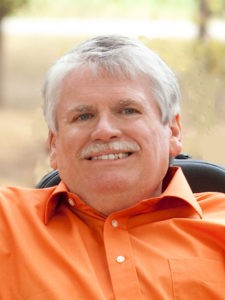Rodolfo has been taking care of my yard for three or four years. He does a great job and is one of the hardest-working guys I know. I see him all over the neighborhood, mowing and trimming grass. He tends to residential lawns as well as commercial property.
We got hooked up because he was doing my nextdoor neighbor’s yard, and I needed someone. I caught him one day and suggested he could make us both a good deal since our yards were essentially one. He agreed.
He no longer does the yards of any of my immediate neighbors, but he still does mine. I’ve increased what I pay him, not because he ever asked for more but just because I thought it was more fair.

Terry Austin
Rodolfo is probably about 50 years old, has a couple of daughters in college and a wife who sometimes works with him. He has long hair that hangs in a ponytail halfway down his back. Also, he speaks less English than I speak Spanish. Yet we communicate. If I need him to do something that requires a complex explanation, I’ll leave a message on his phone, and his daughter will call back and explain to her dad what I need. Done, it’s taken care of.
I like Rodolfo, and I think he likes me. We try to communicate beyond “buenos dias” and a few arm waves, but we don’t get much further. Rodolfo and I never will be close friends until one of us bites the bullet and learns the other’s language. Communication is an integral part of relationships.
At the other end of the spectrum are those who build a relationship strictly on language and very little else. I guess the clearest example of this is our Facebook friends. I have 1,143 Facebook friends. I know a few of that number have died and a high percentage of those still living never have been in the same room with me at any time in our lives. We are “friends” only in the sense that we speak a common language.
I’ve lost many Facebook friends over the years because of the language I speak on Facebook. To be honest, none of my siblings are on my friend list. They’ve never said anything, but I don’t think they like my politics. Since we speak a different language, we find it challenging to be Facebook friends.
“Since we speak a different language, we find it challenging to be Facebook friends.”
Only relating to those who speak the same language would be boring and unfulfilling. Who would do my yard for me? I guess I could hire some high school kid to mow the grass, but I’m not sure we would communicate any better.
If you only relate to those who speak the same language, you will find yourself isolated from much of the world. Do it long enough, and you essentially become useless to the world since the only thing you know is the same things your friends already know. That’s why it’s dangerous to get all your news and information from one source and surround yourself only with people who see the world the same way you do. When that occurs, you don’t actually have a relationship; all you have is a common language.
This is what has happened with the American version of the Christian faith. It’s no longer built on a relationship. The thing that holds it together is the common language. Christians teach the language to their children from the beginning. They tell Bible stories, which are important, but the goal is to lead them to a point where they know the language — primarily the language of a prayer that promises salvation.
The prayer goes like this: “God, I’m a sinner. Please forgive my sins. I accept Jesus as my personal savior. In Jesus’ name. Amen.”
It’s often called the Sinner’s Prayer. It doesn’t have to be these precise words, but it’s important to understand the language. Learning this prayer is like learning the alphabet of the church. If you ask most American Christians when they were saved, they will tell you about when they recited this prayer. It was the time when they first learned the language.
For many, it happens at a young age. I’ve heard of 3- and 4-year-olds reciting the words. For others (a much smaller number), it happens when they’re older and someone comes along to teach them the language.
The understanding is that as soon as you say those words, you are saved, born again. The rest of life is spent becoming more and more proficient in the language. Sometimes kids are led through catechism classes, others have discipleship classes, or perhaps just Bible studies along the way, but the end goal is to learn the language better.
The language served the church well for a long time, but recently, a big chunk of the church got off track. The idea of maintaining a relationship with Jesus and others became not nearly as important as learning the language. If you know the language, now you can do anything you want.
“A personal relationship with Jesus is not necessary as long as you know the language.”
This is especially true with the part of the church known as “evangelical.” For most of history, “evangelical” described Christians who emphasized an experience of salvation (born again) and a personal relationship with God through Jesus. But it doesn’t mean that any longer. A personal relationship with Jesus is not necessary as long as you know the language.
The primary example is the way the church has embraced Donald Trump. The man never has prayed the “Sinner’s Prayer” because, in his own words, he doesn’t think he’s ever sinned. If he did, he would stop and simply do better. He doesn’t know anything about the Bible, evidenced by his answers to questions about his favorite verse and mispronouncing biblical terms. He has no history of church attendance or Bible reading. Yet, he knows the language of faith, at least the faith of evangelicalism.
More evangelicals support him than any other president in history. Christian leaders clamor for the opportunity to praise him in public. They defend any and every hateful and off-color remark. They excuse his deplorable past and disgusting descriptions of his own actions. All this is not because he is a Christian but because he has learned the language of the faith. They don’t care if he’s a believer as long as he speaks their language.
If you don’t know the language of the faith, you will not be welcome or comfortable in the majority of evangelical churches in this country. Even if you’re a follower of Jesus, you will hear sermons that make no sense because you don’t know the language. Let me rephrase that last statement: Especially if you’re a follower of Jesus, you will hear sermons that make no sense.
It is now possible to be filled with hate, hold racist beliefs about people of color, treat immigrants like trash or wild animals, turn your back on the poor who can’t earn their own living, and feel no remorse for those who die because they couldn’t afford available medicine, and still be considered a Christian. Why? Because the Christian faith is no longer about a relationship. It’s only about knowing the language of faith.
“The Christian faith is no longer about a relationship. It’s only about knowing the language of faith.”
Essentially, if you know the language, there’s no need for Jesus. He just gets in the way.
Learning the language of faith is not hard. In fact, we might even say Trump is a genius at that point. He not only learned the language; he has coined a bunch of new terms and phrases that are now included in the American Christian dictionary. The slogans of the evangelical church are:
- Build the wall.
- Lock her up.
- Send them back.
- Make America great again.
The basic tenets of the evangelical church are:
- Every abortion is murder.
- Immigrants are dangerous.
- Gun ownership is essential.
- Economy trumps environment.
- Democrats are wrong and Republicans are right.
- Poor people are lazy.
It is no longer necessary to follow Jesus, love your neighbor, care for the poor and needy, be a careful steward of the world, preach the gospel, or any of the other basics of the faith that were taught by the church for generations. The only thing necessary today is to learn the language of faith.
As long as you understand “build the wall,” then you can hate immigrants. It’s much easier to shout “lock her up” than it is to hold all officials accountable for what they do. If you can say, “Send them back,” then don’t worry about being a racist, it doesn’t matter. The bottom line is that if you truly comprehend the words, “Make America great again,” then the rest of the world and all mankind who are not Americans can go to hell — they’re not our problem.
I was a proud member of the evangelical church for most of my life. About 10 years ago, the changes in the church were becoming so great that it was unsettling. I tried to stick with it, I really did, but so much of what was happening I was taught was wrong. I didn’t see any way to stay. I couldn’t learn the language. I was unwilling to immerse myself in that environment enough for the language to become natural.
It’s now easier for me to communicate with Rodolfo than it is with many people who consider themselves evangelicals. We don’t speak the same language any longer. My faith is much more than a language and still requires a relationship — with Jesus and my neighbor.
Terry Austin says from his first day of life he was taught to love the church. He has lived out that passion in various ways as a pastor, church consultant, author and critic. He is currently a full-time writer and book publisher and actively engaged with house churches.
Related articles:
Today’s evangelicals are medieval crusaders at heart | Analysis by Rodney Kennedy
Who are you? Non-Trumpist evangelicals struggle to be identified


